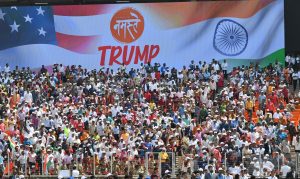
Indians seeking emigration in the United States are faced with a devil and the deep sea situation. On the one hand, they face expulsions when their H-1B visas expire; on the other hand, they worry about repaying their loans with the meager salaries offered back home. Last week, President Trump imposed a slew of discretionary measures, which included a temporary immigration ban and deferral of green card issuance for 60 days, to protect “American jobs.” Although the decisions seemed in larger interests of the US, they have plunged some people’s lives into depths of uncertainty as they wait with bated breath hoping for some positive announcements after India urged the US to reconsider.
In Manasi Vasavada’s case, for instance, she has less than three weeks before she loses her legal right to be in the country. The 31-year-old dental practitioner has been on unpaid leave from her work in Passaic County, New Jersey, since mid-March due to COVID-19. Vasavada had been working there for almost two years before it was shut last month. H-1B visa holders can remain in the country legally only for 60 days without being paid. Vasavada’s husband, Nandan Buch, also a dentist, holds an H-1B visa as well, which will expire in June. The couple has been leaving in fears since the rule change as the uncertainties grew.
But it is not the first time the Trump administration has sought to restrict emigration. He had consistently taken an uncompromising stance on immigration and foreign-born workers. It is evidenced in the sharp drop in the number of applicants since 2015. According to the State Department, the number of non-immigrant visas issued declined for the fourth consecutive year in 2019 to 8.7 million from 10.9 million in 2015.
Some 2.5 lakh guest workers, including around two lakh visitors on H-1B visas, seeking a green card in the US, could lose their legal status by June, the Bloomberg reported citing immigration policy analyst Jeremy Neufeld, who works with the Washington DC-based think tank Niskanen Center. He said that thousands more who are not seeking permanent residency may also be forced to return home. Unlike the native-born workers, those on work visas are the most vulnerable as they can’t avail of government benefits in crises like the pandemic.
As per rules, the terminated H-1B workers have 60-days to find another job, or transfer to a different visa, or leave the country. Even if they don’t lose their jobs, workers would still struggle to get their visas renewed in the wake of the pandemic. Doug Rand, who worked in the Obama administration, said the H-1B crisis is causing “a catastrophe at a human level and an economic level.”“H-1B workers often have families who also rely on their jobs for authorization to stay in the country, including children who may have spent their entire lives in the US. It’s just a mess,” Bloomberg quoted Mr Rand as saying.
Author Profile
- India Writes Network (www.indiawrites.org) is an emerging think tank and a media-publishing company focused on international affairs & the India Story. Centre for Global India Insights is the research arm of India Writes Network. To subscribe to India and the World, write to editor@indiawrites.org. A venture of TGII Media Private Limited, a leading media, publishing and consultancy company, IWN has carved a niche for balanced and exhaustive reporting and analysis of international affairs. Eminent personalities, politicians, diplomats, authors, strategy gurus and news-makers have contributed to India Writes Network, as also “India and the World,” a magazine focused on global affairs.
Latest entries
 DiplomacyJanuary 5, 2026India walks diplomatic tightrope over US operation in Venezuela
DiplomacyJanuary 5, 2026India walks diplomatic tightrope over US operation in Venezuela India and the WorldNovember 26, 2025G20@20: Africa’s Moment – The Once and Future World Order
India and the WorldNovember 26, 2025G20@20: Africa’s Moment – The Once and Future World Order DiplomacyOctober 4, 2025UNGA Resolution 2758 Must Not Be Distorted, One-China Principle Brooks No Challenge
DiplomacyOctober 4, 2025UNGA Resolution 2758 Must Not Be Distorted, One-China Principle Brooks No Challenge India and the WorldJuly 26, 2025MPs, diplomats laud Operation Sindoor, call for national unity to combat Pakistan-sponsored terror
India and the WorldJuly 26, 2025MPs, diplomats laud Operation Sindoor, call for national unity to combat Pakistan-sponsored terror







